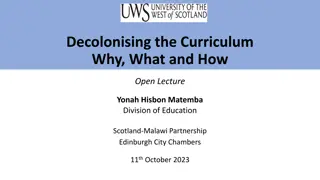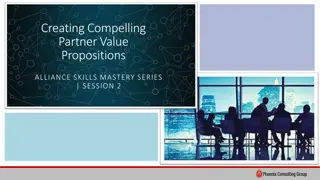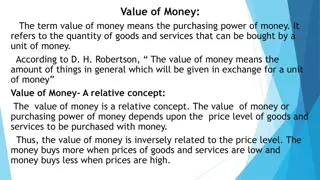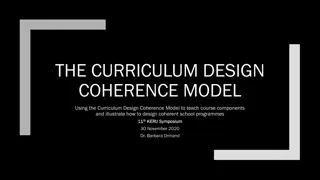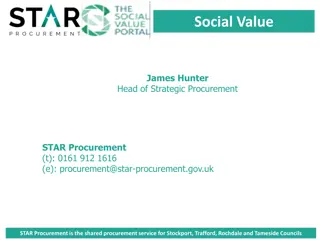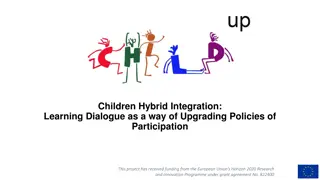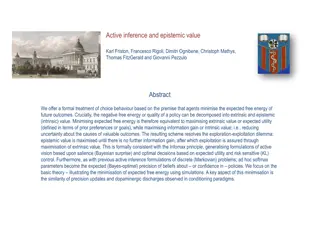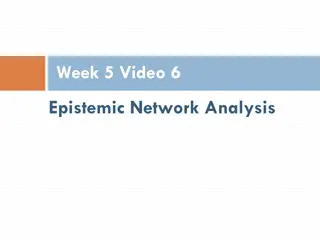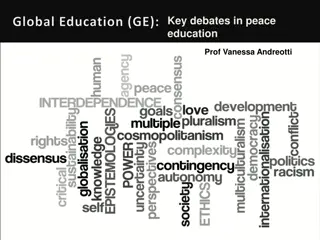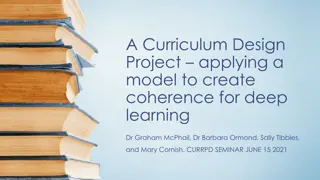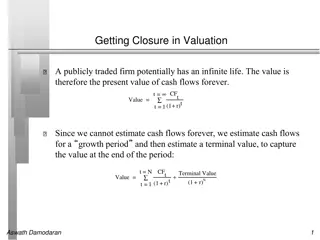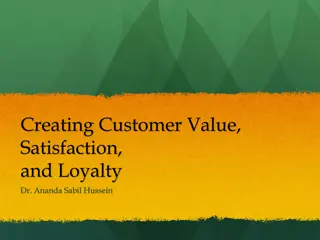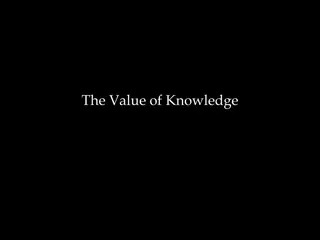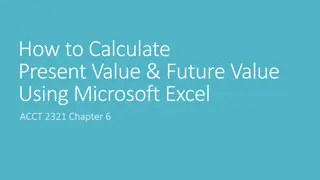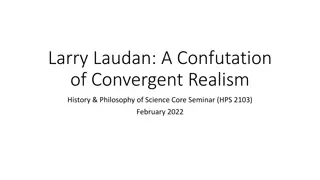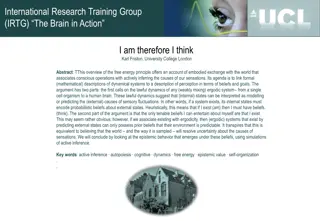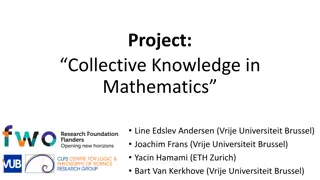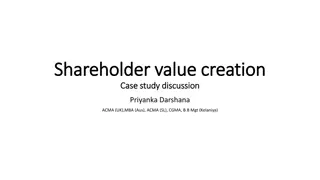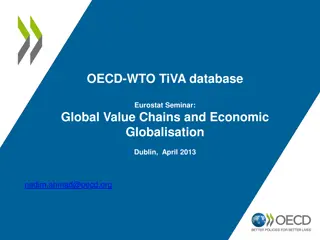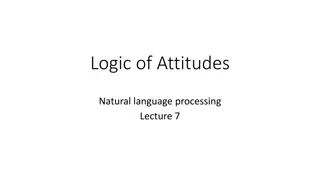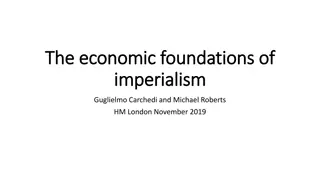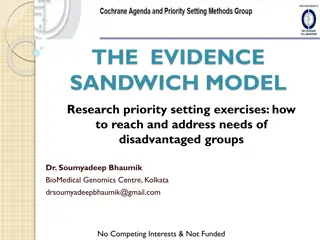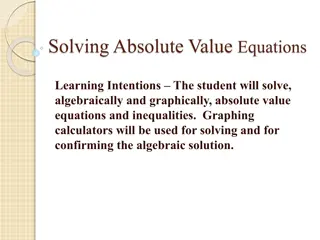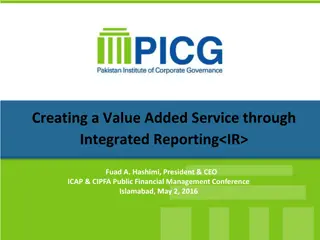Principles for ESS Time Schedule & VDER Usecase.
Exploring the principles and key components of the VDER program, including ESS time scheduling and value stack compensation. The VDER components such as E-value, LSRV, DRV, Energy Value, and ICAP are discussed alongside the MCOS studies that assess marginal system cost reductions due to distributed
1 views • 8 slides
ECC Social Value Reporting and Evaluation Framework
Essex County Council (ECC) has implemented a robust Social Value Reporting and Evaluation framework based on the Local Government Association's National TOMs method. This framework categorizes and assesses social value contributions in two parts - Value Score and Supporting Statement Score - to deri
3 views • 16 slides
Understanding Epistemic Progression in Learning: A Humanities Perspective
Exploring the concept of epistemic progression and its importance in education, this content delves into Basil Bernstein's theories on knowledge structure, trends in history education, and the role of procedural knowledge in fostering progression in disciplines like History.
1 views • 10 slides
Decolonising the Curriculum Why, What and How
Explore the complexities of decolonising the curriculum in Scottish education, addressing epistemic privilege, Black History Month, Scottish history and colonialism, missionary movements, and the nuances of the curriculum itself. Consider the purpose and impact of decolonisation efforts in reshaping
1 views • 24 slides
Maximizing Social Value in Procurement: Strategies for Success
Learn how to maximize social value opportunities in procurement by identifying your strengths, understanding buyer requirements, and preparing your business to offer more value. This involves assessing your impact on local wellbeing, engaging with the community, and aligning with social responsibili
0 views • 20 slides
Murray City School District FY25 Budget Overview
Murray City School District is preparing for the FY25 budget hearing in June 2024. The budget officer, usually the superintendent, must submit a tentative budget before June 1 each year. Legal requirements include holding a public hearing and publishing budget information for public inspection. The
0 views • 25 slides
Understanding Modal Verbs: Epistemic and Deontic Uses
Modal verbs, such as can, could, may, must, will, and should, play a crucial role in expressing modality in English. This content discusses the epistemic and deontic uses of modal verbs, illustrating how they convey likelihood, ability, permission, suggestions, obligations, and advice. Explore the n
0 views • 34 slides
Comprehensive Guide to Creating Partner Value Propositions
Explore the importance of Partner Value Propositions in driving alliances, mastering skills, and enhancing revenue generation. Discover how Customer Value Propositions and Market Trends influence buying motivations and solution offerings. Learn about templates for solving customer problems and examp
0 views • 10 slides
Understanding the Value of Money and Standards
The value of money refers to its purchasing power, which is influenced by the price level of goods and services. Different standards, such as wholesale, retail, and labor, help measure the value of money. Money can have internal and external value, affecting domestic and foreign transactions. The Qu
0 views • 62 slides
Understanding Real Estate Valuation and Market Value
Explore the concepts of real estate valuation, market value, and the methods used to determine the worth of properties. Learn about the importance of valuation in decision-making processes related to investments, financing, operations, and more. Understand how market value is derived based on probab
1 views • 62 slides
Enhancing Teaching Through Curriculum Design Coherence Model
Explore the use of the Curriculum Design Coherence Model (CDC) for designing effective lectures and guiding pre-service teachers in creating coherent lesson plans. Learn about epistemic progression, systematic ordering of knowledge, types of knowledge, and Bernsteins's knowledge structures to design
0 views • 26 slides
Understanding Place Value in Mathematics
Explore the basics of place value, from ones to thousands, and learn how to expand a numeral into its place values. Discover the power of each place in a number and write numerals in expanded form to understand the value of each digit. Dive into the concept of place value through images and explanat
0 views • 23 slides
Understanding Place Value in Numbers
Introduction to the concept of place value in numbers, covering topics such as the value of each digit, place value calculation, successors, predecessors, period division, ascending/descending order, and the importance of numbers in everyday life. Explained through examples and visuals, this educati
0 views • 26 slides
Enhancing Social Value through Strategic Procurement
STAR Procurement, the shared service for multiple councils, emphasizes the importance of Social Value in procurement practices. The Social Value Portal serves as a management tool to measure and demonstrate the benefits of Social Value commitments. Bidders are required to provide quantitative and qu
0 views • 14 slides
Enhancing Children's Hybrid Integration Through Dialogue in Education
Presenting research results on enhancing children's agency and hybrid integration through dialogic interactions in school settings, specifically focusing on children with migrant backgrounds. The project aims to propose effective facilitation methods to support the participation of children with mig
0 views • 28 slides
Exploring Inductive Inferences and Their Relation to Probability
Nevin Climenhaga delves into the world of inductive inferences, categorizing them into downward, upward, and sideways forms. He discusses connections with probability, confirmation, epistemic defeat, and more, emphasizing the distinction between direct and indirect forms of inferences.
0 views • 15 slides
Integrated Value Creation in Corporate Finance
Explore the concept of integrated value creation in corporate finance, emphasizing the importance of managing for long-term value while incorporating social and environmental goals. Learn about responsible management practices that focus on creating net present value (NPV) through a balance of finan
0 views • 38 slides
Understanding Active Inference and Epistemic Value in Decision Behavior
This study presents a formal framework for decision-making, suggesting that agents minimize expected free energy of future outcomes by balancing extrinsic and epistemic values. By maximizing information gain and reducing uncertainty, agents navigate the exploration-exploitation dilemma. The strategy
0 views • 18 slides
Understanding Epistemic Network Analysis in Data Studies
Epistemic Network Analysis (ENA) is a method for studying relationships between elements in coded data with various applications. It involves analyzing nodes as occurrences of codes and links as co-occurrences of codes. Using examples like analyzing quitting behavior in a game, ENA can compare group
0 views • 30 slides
Exploring Key Debates in Peace Education by Prof. Vanessa Andreotti
Dive into the intricacies of peace education through the lens of Prof. Vanessa Andreotti, examining the Magolda Model of Epistemic Development. Explore themes such as violence vs. non-violence, complexity of human beings, empathy, critical thinking, and promoting heroic imagination towards cultivati
0 views • 12 slides
Reflections on Values and Identity in Research by David Hildebrand: A Critical Analysis
Delve into thought-provoking questions raised by Sami Pihlström on David Hildebrand's paper, exploring themes such as the impact of changing fundamental values on personal identity, the concept of reflective equilibrium in research methodologies, the significance of core values, the interplay betwe
0 views • 8 slides
Enhancing Curriculum Coherence for Deep Learning: A Model-driven Approach
Addressing the disconnect between conceptual knowledge and applied competencies in education, the Curriculum Design Coherence Model offers a structured framework to create coherence for deep learning. Developed in response to educational challenges such as skills versus knowledge imbalance and fragm
1 views • 28 slides
Understanding Terminal Value in Valuation
Valuation of publicly traded firms with potentially infinite lives involves estimating cash flows for a growth period and a terminal value to capture value at the end. The stable growth rate, which cannot exceed the economy's growth rate, plays a crucial role in determining the present value of futu
0 views • 8 slides
Maximizing Customer Value, Satisfaction & Loyalty in Business
Explore the essence of customer value, satisfaction, and loyalty in business success through Dr. Ananda Sabil Hussein's insightful perspective. Learn about customer perceived value, determinants of value, steps in value analysis, loyalty definitions, satisfaction measurements, and the significance o
0 views • 18 slides
The Value of Knowledge: A Philosophical Exploration
Exploring the value of knowledge through the lens of Plato's Meno Problem, this text delves into why knowledge is considered more valuable than mere true belief. It discusses Plato's solution to the problem, the secondary and tertiary value problems, and constraints on solutions and strategies in un
0 views • 22 slides
How to Calculate Present Value & Future Value Using Microsoft Excel
Learn how to calculate present value and future value using Microsoft Excel functions such as PV and FV. Understand the syntax, arguments, and examples for determining the value of single amounts, annuities, and lump sums. Step-by-step instructions provided for efficient financial calculations.
0 views • 14 slides
Critique of Convergent Realism by Larry Laudan
Larry Laudan's "A Confutation of Convergent Realism" challenges the notion of epistemic realism by arguing that historical evidence does not fully support it. He discusses Convergent Epistemological Realism (CER) and presents abductive arguments questioning the truth and empirical success of scienti
0 views • 18 slides
The Free Energy Principle and Active Inference in Cognitive Dynamics
This overview of the free energy principle by Karl Friston delves into how conscious operations are linked to inferring causes of sensations, emphasizing the necessity of probabilistic beliefs about external states. The discussion includes topics like embodied exchange with the world, ergodic system
0 views • 32 slides
Exploring Land Value Return and Recycling for Transportation Funding
With transportation investment needs surpassing available resources, investigating the potential of land value return and recycling as a revenue source can benefit public agencies. This involves recovering and reusing a portion of the increased land value generated by public investment in transporta
0 views • 33 slides
Exploring the Intersection of Social Epistemology and Mathematics
Delve into the intertwining realms of social epistemology and mathematics, examining the collaborative knowledge creation within the mathematical community. This work emphasizes the social dimensions influencing mathematical practices and the epistemic norms shaping reliable mathematical knowledge.
0 views • 15 slides
Maximizing Shareholder Value Creation Through Strategic Business Practices
Explore the concept of shareholder value creation, the importance of generating revenues exceeding economic costs, and meeting shareholders' expectations. Learn about Economic Value Added (EVA), key value drivers, aligning strategy with value creation, and essential factors for overall business succ
0 views • 11 slides
Understanding Trade in Value-Added (TiVA) and Global Value Chains
Trade in Value-Added (TiVA) offers crucial insights into the complexities of global value chains and economic globalization. By shifting focus from gross trade statistics to value creation along supply chains, TiVA helps in formulating better policies and addressing systemic risks associated with ma
0 views • 22 slides
The Politics and Ethics of Knowledge Production in Migration Studies by Sari Hanafi
This insightful study delves into the politics and ethics surrounding knowledge production in migration studies. It explores the normativity of migration studies, identity politics, and universalism, while emphasizing the importance of ethics and epistemic community. The discourse also touches upon
0 views • 16 slides
Understanding Propositional and Notional Attitudes in Logic and Natural Language Processing
Explore the intricate concepts of propositional and notional attitudes in the context of logic and natural language processing. Dive into the distinctions between belief, knowledge, seeking, finding, solving, wishing, and wanting within the realms of individual intensions and hyper-intensions. Under
0 views • 16 slides
Pre-Service Teachers' Beliefs and Reception of Educational Research
Exploring the awareness and trust of pre-service teachers in educational psychology misconceptions, epistemic trust in educational scientists, questioning prior beliefs when faced with evidence, and beliefs about the instrumental quality of information sources for teaching. The symposium delves into
0 views • 10 slides
Economic Foundations of Imperialism: Exploitation and Value Transfer
Imperialism primarily functions as an economic mechanism for exploiting value rather than seeking political dominance. The transfer of value occurs through mechanisms like unequal exchange, global value chain flows, and capital flows, leading to the long-term appropriation of value by imperialist na
0 views • 28 slides
Evidence Sandwich Model: Addressing Needs of Disadvantaged Groups
In a world of medical advancements, reaching those in resource-poor settings remains a challenge. The Evidence Sandwich Model explores ways to prioritize research, collaborate, and tackle implementation bottlenecks to deliver basic care to disadvantaged populations. Led by Dr. Soumyadeep Bhaumik, th
0 views • 18 slides
Understanding Absolute Value Equations and Inequalities
In this lesson, students will learn to solve absolute value equations and inequalities both algebraically and graphically. The concept of absolute value, which represents the distance between a number and zero on the number line, is explained through examples and solutions. The importance of using g
0 views • 43 slides
Business Model Reporting for Value Creation
Integrated Reporting (IR) plays a crucial role in forging business partnerships and facilitating sound decision-making. Understanding the organizational business model is essential for long-term sustainability and value creation. The global approach to business model reporting encompasses business s
0 views • 42 slides
India Fellowship Seminar: Product Contributions to Growth, Risk Management, and Shareholder Value
India Fellowship Seminar discussed the contributions of participating and non-participating products to premium growth, risk management, and shareholder value. Key topics included market trends, drivers of shareholder value, PAR vs NPAR attractions, creating shareholder value, and risk management st
0 views • 21 slides



